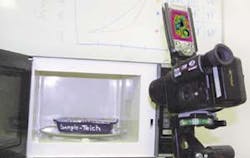
Portable infrared (IR) cameras can be hooked to laptop computers for image recording and display, a setup that ends up being unwieldy, perhaps deserving the term "totable" instead of portable. True portability would result from a unit small enough to be handheld. A camera interface package developed by Electrophysics Corp. (Fairfield, NJ) allows a compact IR camera to be joined directly to a personal digital assistant (PDA) that serves as an image recorder, display, and camera control. The whole system is hardly larger than the camera itself. The system makes tasks such as the inspection of electrical systems easier to perform.
Initially intended for use with an IR camera produced by Raytheon Commercial Infrared (Dallas, TX), the system is built around a PDA made by Compaq Computer (also of Dallas, TX). The Compaq PDA was chosen over others because it has a more suitable expansion port, according to Art Stout, vice president of sales and marketing at Electrophysics. The 5-Mbyte/s output of the IR camera is multiplexed to an interface card inside the accessory sleeve of the PDA. The system allows 30-frame/s viewing of uncompressed digital camera data. With a 512-Mbyte flash memory card, the system can store thousands of 320 x 240-pixel snapshots.
A prime motivation for developing the system was to make available a good liquid-crystal display (LCD), said Stout. "One of the most difficult things to procure is LCDs," he noted. "Camcorder displays are not available as separate components, so the only LCDs normally available are high-cost, low-volume displays that are large and heavy." According to Stout, the company hopes to develop a series of standard interfaces, allowing other cameras to be linked with a PDA. The camera system will be used for predictive maintenance in manufacturing environments as well as power-line inspection. In this photo, the camera captures an image of a frozen dinner after heating in a microwave oven; the resulting data show how evenly the food has been reheated.
About the Author
John Wallace
Senior Technical Editor (1998-2022)
John Wallace was with Laser Focus World for nearly 25 years, retiring in late June 2022. He obtained a bachelor's degree in mechanical engineering and physics at Rutgers University and a master's in optical engineering at the University of Rochester. Before becoming an editor, John worked as an engineer at RCA, Exxon, Eastman Kodak, and GCA Corporation.
